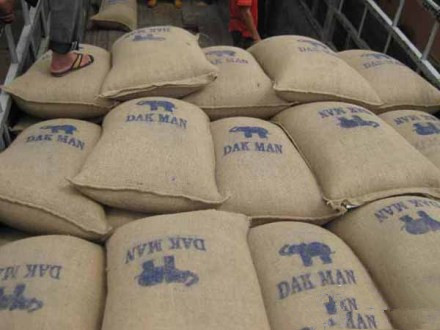How far is China's coffee market from a big coffee consumer?
In Fushan, a small town in the western corner of Hainan, fragrant cafes are full all the year round, and local residents consume more than 200 cups of coffee per capita each year. This astonishing consumption impressed coffee suppliers from all over the world who came here to participate in the International barista Championship.

"Chinese people began to be interested in coffee culture, which made me see the huge market potential." The Consul General of the Consulate General of the Federal Democratic Republic of Ethiopia, Melaku Legg, said in an interview.
At the site of the third China Fushan Cup International Barista Championship held in Fushan Town, Chengmai County, top players from 12 countries and regions competed for the championship, attracting more than 200 professionals from all over the world to promote their local coffee.
David, a coffee supplier from Uganda, told reporters, "Chinese people have begun to attach importance to coffee. With the promotion of coffee culture and the rise of the middle class, the coffee market here is growing rapidly."
With the increasing diversification of domestic drinks in China, the gradual connection of coffee with fashion and modern life has led to a rapid increase in coffee consumption in China. Relevant statistics show that in 2012, the coffee consumption in China was about 130000 tons. In the future, China's coffee consumption will continue to grow at an annual rate of 15% and 20%, and is expected to become the most potential coffee consumer in the world.
However, many professionals said that although the growth rate of China's coffee consumption market is gratifying, the coffee culture is not mature enough, the regional consumer market is uneven, and there is a lack of domestic brands that can tap and spread China's local coffee culture.
"the number of cafes in China has exploded, but coffee consumers have not followed suit." Ji Ming, president of the Beijing Coffee Industry Association, said that in recent years, coffee consumption in first-tier cities such as Beijing and Shanghai and some southern cities has indeed increased rapidly, but China's current per capita annual coffee consumption is only 5 cups. This is far lower than the annual per capita level of about 300 cups in Japan and South Korea, and the world average is about 240 cups.
Huang Huiying, director of food culture research in Guangdong Province, believes that coffee has become a new favorite of leisure drinks for many young people, but Chinese coffee culture is not mature enough, and many people drink coffee to catch up with the trend.
In terms of brand development, the Chinese market is almost carved up by foreign brands. In the current coffee consumption market, following Starbucks' strong presence in the Chinese market, international brands such as Seattle Coffee in the United States, Canada's Baiyi and Canada's second cup of coffee have followed suit one after another. International brands such as Nestl é and Maxwell account for more than half of the instant coffee market.
Xu Shibing, president of the Hainan Coffee Association, said that due to geographical location and climate limitations, China's coffee production is mainly in Yunnan, Hainan and Sichuan, and the output is limited. There are a large number of coffee enterprises in China, mainly supplying raw materials and small coffee enterprises, and the leading enterprises are growing slowly.
According to the statistics of Yunnan Coffee Industry Association, the planting area of coffee in Yunnan exceeded 1.4 million mu in 2013, and its coffee planting area and output accounted for more than 90% of China's coffee. However, in the 2012-2013 season, Yunnan produced about 82000 tons of coffee beans, of which more than 50, 000 tons were exported overseas.
Due to the lack of standardized identification and operation from raw material planting to product production to coffee preparation, Chinese local coffee enterprises are facing the challenges of specialization, scale and branding.
"China needs to cultivate a number of local brands that combine local regional and cultural characteristics, and can devote themselves to improving the standardized production of coffee, further spreading coffee culture, and cultivating people's consumption habits, which needs the support of the government. it also depends on the enterprises themselves to go out to learn and cooperate." Ji Ming said.
Important Notice :
前街咖啡 FrontStreet Coffee has moved to new addredd:
FrontStreet Coffee Address: 315,Donghua East Road,GuangZhou
Tel:020 38364473
- Prev

Korean cafes reward polite customers the more courteous they order, the more discounts they get.
A cafe in South Korea rewards polite customers, and the more polite they order, the more discounts (video screenshot) International online article: according to Yonhap news agency on January 6, South Korea's Angelinus will launch a new promotion from the 7th of this month, a warm word. On every event day, the barista will discount or increase the price of the food ordered according to the politeness of the customer's language.
- Next

Boutique coffee bean futures Arabica coffee futures decline due to extension
Raw sugar futures fell on Friday as Arabica coffee fell before markets closed in the United States and Brazil on expectations of precipitation in Brazil, the largest grower, with a large number of March / May contract extensions. Arabica coffee futures rose for a third day to a two-month high as Vietnam, the largest grower, ushered in a holiday. Cocoa futures rose to their highest level in more than three weeks, buoyed by supply concerns in Ghana. Monday is the president of the United States.
Related
- What grade does Jamaica Blue Mountain No. 1 coffee belong to and how to drink it better? What is the highest grade of Blue Mountain coffee for coffee aristocrats?
- What are the flavor characteristics of the world-famous coffee Blue Mountain No. 1 Golden Mantelin? What are the characteristics of deep-roasted bitter coffee?
- Can I make coffee a second time in an Italian hand-brewed mocha pot? Why can't coffee be brewed several times like tea leaves?
- Hand-brewed coffee flows with a knife and a tornado. How to brew it? What is the proportion of grinding water and water temperature divided into?
- What is the difference between Indonesian Sumatra Mantinin coffee and gold Mantinin? How to distinguish between real and fake golden Mantelin coffee?
- What does bypass mean in coffee? Why can hand-brewed coffee and water make it better?
- Unexpected! Ruixing Telunsu lattes use a smoothie machine to foam milk?!
- % Arabia's first store in Henan opens into the village?! Netizen: Thought it was P's
- Does an authentic standard mocha coffee recipe use chocolate sauce or powder? Mocha Latte/Dirty Coffee/Salty Mocha Coffee Recipe Share!
- What is the difference between Vietnam egg coffee and Norway egg coffee? Hand-brewed single product coffee filter paper filter cloth filter flat solution!

